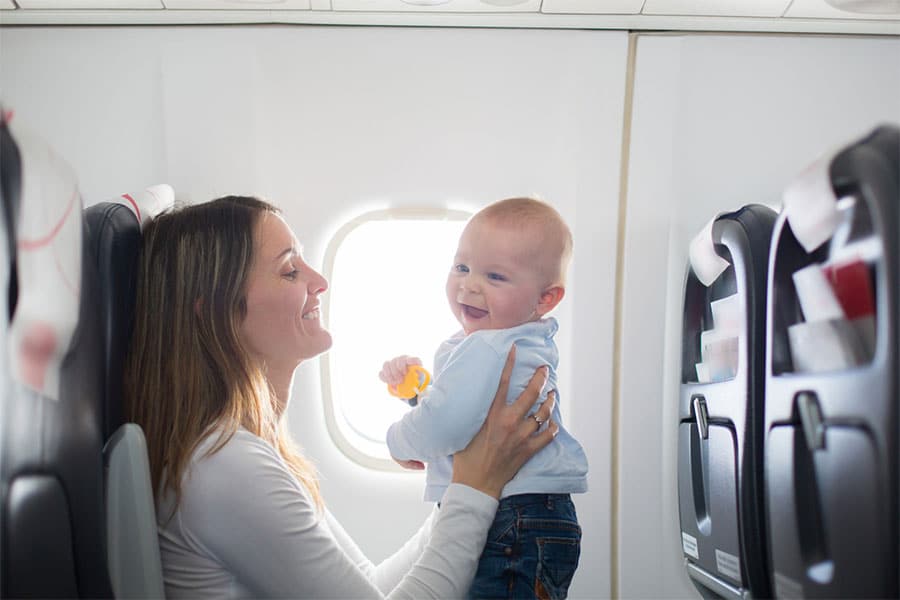If you have a newborn or infant and are faced with an upcoming airline flight, you may be a bit nervous. After all, babies are unpredictable and you never know if they’ll fuss the whole flight or sleep right through it. Even the most seasoned travelers worry when traveling with an infant, especially for the first time. It can be pretty overwhelming planning for this type of journey, but with the proper preparation, you can handle it with ease.
Part of planning is being prepared, and part of being prepared is reserving your DTW airport parking ahead of time.
Check out these tips for flying with a baby.
Age Suggestions
If a trip with your baby is inevitable, you may wonder: how old do babies need to be to travel on a plane? Many airlines allow this to happen when the child is one to two weeks old. But if you ask your doctor, you may find out that they recommend waiting till your child is over two months to ensure they have begun or have completed their primary immunization series. Plus, after the age of two months, usually the brunt of colic and fussiness has passed.
Requirements to Fly
Check out the documents you will need when flying with your baby or toddler:
- Ticket: Most airlines allow infants under the age of two to fly for free on an adult’s lap. However, you may want to consider purchasing a separate seat for your baby so they can be contained in a child safety seat that has been approved by the Federal Aviation Administration (FAA). Securing your baby in an approved child restraint system makes the flight easier and more comfortable for both you and your child, plus it gives you peace of mind knowing they are safe at all times. After all, who wants a squirming baby on their lap the whole flight? And what do you do with them when you need to visit the restroom?
- Passport: All children no matter how young or old they are need a passport to fly internationally.
- Birth certificate: Bring your baby’s birth certificate just in case, as some airlines require proof of age documentation for children under the age of 18.
- Letter of consent: If you are a single parent traveling internationally with a child under 18, you may need to furnish a letter of consent signed by the other parent. Sometimes, these letters are required for domestic travel as well. Always ask the airline beforehand. The agreement you have with your ex-spouse, if divorced, should detail this in the custody plan.
Bring Extra Clothes
If you’re a parent, you know how quickly kids can soil themselves. This is why it’s a smart idea to bring a few changes of clothing for both of you in your carry-on bag. You will be grateful for the spare clothing if your baby spits up or has an accident.
Protect Baby’s Ears
Even for adults, the change in altitude can be very alarming. Adults can chew gum or suck on a lollipop to pop their ears during such changes, but babies can do neither of those things. Plus, they may become alarmed at what they’re feeling and cry out because they don’t understand. However, swallowing can provide some relief of ear pain. If possible, time your baby’s feedings for shortly after takeoff and shortly before landing.
Breast milk and formula, according to the TSA, are exempt from the 3.4 ounces typically allowed in a carry-on. Try to pump your breastmilk beforehand, bring formula and water to mix on the flight, or pack pre-mixed formula bottles. If feeding your baby doesn’t work or they are not hungry, try giving them a pacifier to relieve pressure.
Pack Smart
Bring medication and toiletries in pill containers or secure plastic bags and store them where your baby can’t get at them. Here are some suggestions on what to pack in your carry-on:
- Extra necessities: Bring twice the amount of formula, bottles, food, snacks, burp cloths, diapers, and blankets than you think you will need. You will be happy you did this if your flight is delayed or canceled.
- Toys and books: Pack books and soft toys to keep your baby occupied during the entire flight.
- Plastic bags: Place a change of clothes, some wipes, and diapers in a plastic bag so you can quickly access them if you need them.
- Ice packs: The TSA allows passengers to pack ice packs for travel if needed for cooling baby formula or food.
Book a Direct Flight
Because takeoff and landing can cause painful ear pressure that may make your baby wail, it’s best to limit those instances by booking a direct flight. Booking a connecting flight will double the times you, and baby, will have to go through this. If you have no choice but to book a connecting flight, try to find one with a longer layover of at least two hours or more. This will give your baby time to recover and rest before continuing on. Plus, this will give you ample time to visit the restroom, change your baby and feed them without rushing.
Visit the Restroom Before Getting on the Flight
It’s best to board the plane with a dry baby. Take a few minutes before boarding to visit the restroom for a much-needed diaper change. Place extra diaper cream and two diapers on your baby to prevent leaks and chafing.
Try Pre-Boarding
Pre-boarding with your baby will give you more time to get settled in before the other passengers start boarding the plane. However, if you know your baby is agitated, consider boarding last to limit the time constrained in a seat.
Rent or Gate-Check Baby Equipment
Chances are, your airline allows you to gate-check all large baby gear, including car seats and strollers. Be sure to request gate-check tags at the gate and attach them to your items. You will then leave those items at the bottom of the jetway when boarding, and pick them up when departing.
If you don’t want to hassle with this, you can always rent your baby equipment, such as cribs, high chairs, bassinets, and strollers, once at your destination.
Dress in Layers
Choose comfortable clothing items that can be layered if the temperatures change. It may be hot outside when you board, but we all know how chilly airplanes can get. If you are breastfeeding, wear a wrap or shawl that can provide privacy yet also serve as a blanket.
Reserve Parking Before You Fly
You can avoid a lot of the stress of parking and heavy traffic when you reserve a spot ahead of time. Take a convenient shuttle and take a ride with your baby (and all your baby gear) right to the terminal entrance.
Contact Valet Connections at (734) 992-4946 to reserve your parking spot today. We wish you the best of luck flying with your baby!


